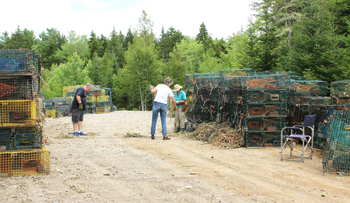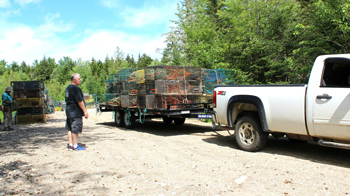Pilot Project to Recycle Unwanted Traps in Gouldsboro

Volunteers at the trap recycling facility adjacent to the Gouldsboro transfer station. The town leased the project the land for $2 per year. Students from local high schools participate in the project. Fishermen’s Voice photo.
Stacks of worn-out lobster traps are a common sight along the Maine coast. Some of these stacks have been in place so long vegetation is growing up through the wire. The reason very often is that there is no way for lobstermen to dispose of them.
A pilot program in Gouldsboro, Traps 2 Treasure, aims to create a place where lobstermen can dispose of their unwanted traps. At the same time participating lobstermen will be supporting a marine educational program at local schools, providing materials that will be recycled to help fund the trap recycling project, reducing the amount of trap debris that ends up on the bottom and pick up a tax deduction as well.
Marine Pathways is a program that provides high school students with exposure to the many marine based occupations available that they may find provide suitable options to college or fishing. OceansWide is a nonprofit that works with schools to assist students in the Marine Pathways program who want to get open water dive certification. Independent funding supports the school dive program.
The Traps 2 Treasure concept evolved out an OceansWide dive class held on board the Maine Seacoast Mission’s Sunbeam. The students were operating a Remotely Operated Vessel and were surprised to see on the ROV’s screen that there were a large number of ghost lobster traps on the bottom. The OceansWide director, Campbell “Buzz” Scott, asked the class what they thought they could do about these ghost traps. “That,” said Becky O’Keefe, who sits on Gouldsboro’s solid waste committee, “was when the seed for Traps 2 treasure was planted.”

Fisherman backing in a trailer of unwanted traps at the Traps 2 Treasure facility in Gouldsboro. Trap donors get a $2 per trap tax deduction. Revenue is put back into the non-profit project and a local high school education program. Fishermen’s Voice photo.
The students decided they would see how many unwanted traps they could identify in their neighborhoods over a weekend. They later arranged with the trap owners to pick them up with a borrowed trailer. That resulted in about 200 traps being collected on their first effort. This is where O’Keefe got on board as the Traps 2 Treasure program director. “The Gouldsboro selectmen, many of them fishermen, were in favor of the project,” said O’Keefe. “They liked that is was non-profit and that the money from recycling would go back into the project and the Marine Pathways program.”
The town leased Traps 2 Treasure two acres of land next to the town’s transfer station property for $2 per year. Clearing of the land was donated and gravel and the spreading of it was also donated.
The program officially opened on June 7 and by Aug. 11 there were more than 500 traps donated to the program. Bricks are removed before a specially designed machine crushes a 4-foot trap into a 6-inch X 6-inch X 4-foot bar of wire. The crushed wire is sold and recycled, brick weights are sold as paving blocks and rope is currently coiled for emerging uses such as woven mats, said O’Keefe.
“The goal, said Buzz, is to reach a point where the number of traps being recycled at these facilities equals the number of new traps entering the fishery. The proactive approach is considered a way to afford an opportunity to address the trap disposal problem in a way that works for fishermen and coastal communities.”
Sources of the traps are those found washed up along the shore, brought to the Gouldsboro facility by fishermen and those picked up from landowners on request.
Lobster traps are private property protected by regulations and tags. Those regulations prohibit anyone other than the owner handling them. The project uses a contract to grant permission to Traps 2 Treasure to handle traps when donors sign the contract. The contract also serves as a document for donors to get a $2 per trap tax deduction.
The Traps 2 Treasure project now accepts traps from surrounding communities. It is hoped that other communities will establish similar programs for recycling unwanted lobster traps. O’Keefe said, “Traps 2 Treasure welcomes any support for the project, whether monetary, gravel, trailers or sheds.”
Anyone interested in starting a trap recycling program in their community can contact Becky O’Keefe at: beckyokeefe53@gmail.com or Buzz Scott at: 207-620-6037.
